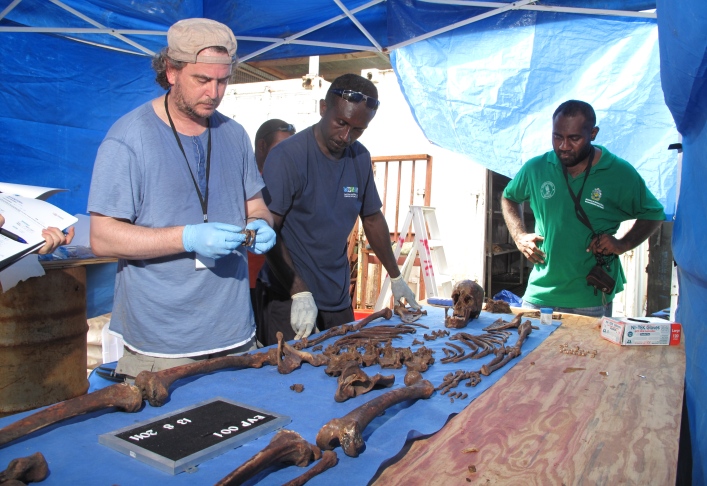
Luis Fondebrider working in the Solomon Islands // Submitted photo
Science for human rights
In the aftermath of atrocities, human remains are often critical to revealing the truth. Argentine investigator Luis Fondebrider helps those ghosts speak through the sciences of genetics, anthropology and archaeology.
The founder of the Argentine Team of Forensic Anthropology is visiting the University of Manitoba this month to give a free public lecture and help train graduate students and professors.
What: Bones, Ghosts and Human Rights: How Science Can Further Justice
When: 2:30 p.m., Wed. Feb. 12, 2014
Where: Concourse Lounge, University College, Fort Garry campus, University of Manitoba
Fondebrider pioneered the application of forensic science to recovery and identification of the remains of victims of Argentina’s military dictatorship. The organization he founded now works across 40 countries in South America, Asia, Africa, Europe and the Middle East. He also teaches legal medicine at the University of Buenos Aires.
This is will be a rare opportunity to learn directly from Fondebrider, who has only been in Canada once before.
“Many victims of state terror are killed and disappeared without trace. Therefore, the work of Mr. Fondebrider and his team is critically important to national reconciliation, justice and closure for the victims’ families,” said U of M professor Jorge Nállim, who witnessed Argentina’s military dictatorship and now studies Latin American history. “His work is an inspiration to U of M students regarding the possibilities of applying scientific knowledge to the betterment of society.”
Nallim organized the event along with historian Julie Gibbings, who researches political violence in Guatemala, and Annette Desmarais, U of M’s new Canada Research Chair in Human Rights, Social Justice and Food Sovereignty. Desmarais recently returned from monitoring an election in Honduras.
“Researching human rights in the Americas and around the world is a strategic priority for the University of Manitoba. This is such an exciting place to work because we have many faculty members and graduate students who are dedicating themselves to human rights work,” Desmarais said.
The visit is also supported by the Canadian Museum for Human Rights (CMHR), which will conduct a recorded oral history interview with Fondebrider to include in its growing collection of first-person human rights stories.
“Education is the most important tool we can use to promote human rights in Canada and around the world,” said Clint Curle, head of stakeholder relations at the Museum. “The purpose of the CMHR is to spur reflection and dialogue about human rights – not only within our museum’s walls, but also through partnerships and public events like this.”
For more information, contact Jorge Nállim at 204-474-6387 or Jorge.nallim@umanitoba.ca, or Annette Desmarais at 204-474-6086 or annette.desmarais@umanitoba.ca .
Questions about the CMHR’s oral history project or its human rights partnerships can be directed to Maureen Fitzhenry at 204-289-2112 or maureen.fitzhenry@museumforhumanrights.ca.







